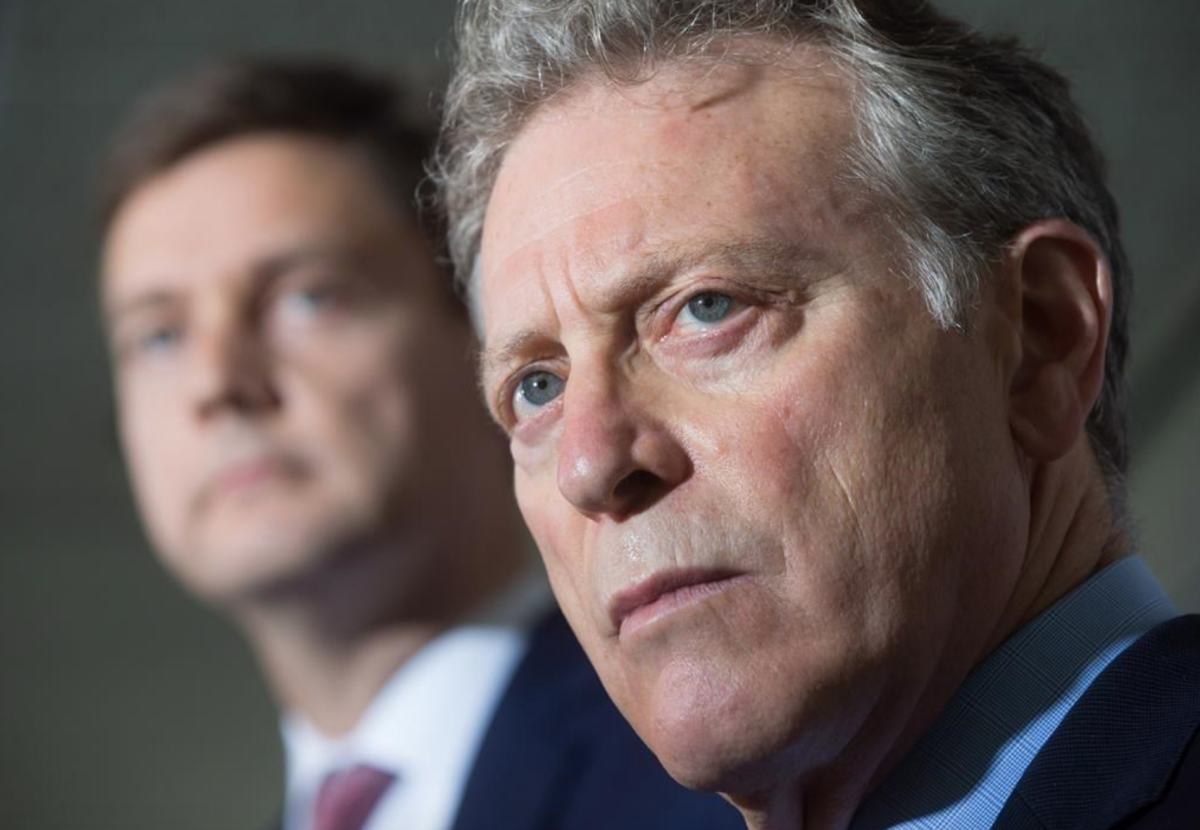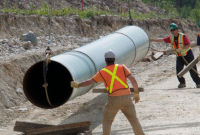Support strong Canadian climate journalism for 2025
Two years ago, Justin Trudeau recognized that the National Energy Board could not be trusted.
The man who would become prime minister said the Board had torqued reviews making it easy to recommend approval. At the time, he promised that the regulator's review of Kinder Morgan's Trans Mountain expansion proposal would be redone.
Yet despite Trudeau’s promise, Kinder Morgan expected business as usual. Commenting on the impact Trudeau’s government would have on Trans Mountain in October 2015, Kinder Morgan Canada president Ian Anderson quipped: “I’m wearing my Liberal red tie.”
After audible laughter, Anderson continued. “…We’ll certainly be briefing the Liberal government in due course on the project…”
As the federal registry attests, Anderson and his staff are engaged and skilled lobbyists. Kinder Morgan’s briefing of the Liberal government must have gone well. Trudeau broke his promise to Canadians on redoing the federal review of the Kinder Morgan expansion project.
With Trans Mountain’s approval we witnessed first hand what it’s like when government determines policy on the basis of corporate power.
It relies on broken promises.
It relies on duplicity — giving the appearance of due diligence and respect for the public interest, while betraying it.
When the newly elected BC NDP government was sworn in, Anderson was dismissive. He said, “I think we’ll just wait and see what Premier (John) Horgan wants to do, and I look forward to his call.”
Such pomposity is appalling. This degree of arrogance can only be borne out of experience. What Kinder Morgan didn’t expect is a democratically elected government that intends to make good on its campaign promises.

BC NDP enters Trans Mountain battleground
The province will join the legal fight against the federal government’s approval of Trans Mountain’s expansion by seeking intervenor status in court proceedings — proceedings that would not be taking place if Trudeau's promise to overhaul the Kinder Morgan review had been kept.
The B.C. government will not allow construction on Crown land until adequate First Nations consultation occurs and is seeking legal advice on its options regarding a lawsuit in BC Supreme Court challenging provincial approval of the expansion.
Every Canadian should be encouraged by this.
British Columbia’s stand against abusing the interests of the people who live there is a stand against such abuse across the nation. The private financial gain that occurs when huge corporations override cultural, economic and environmental needs of society — aided by duplicitous elected officials who do their bidding — is not unique to B.C. and the Trans Mountain expansion project.
Approval not based on facts
As indicated by a number of scientists and prominent politicians, the approval of the pipeline expansion was not based on facts, evidence or the best interest of Canadians. It was approved to support the private financial interests of a Texas-based pipeline company along with a handful of overextended oilsands producers — and the banks who finance them — caught oversupplying a product long past its climate change 'best before' date.
Corporate powers, their lobby groups, Alberta or Ottawa cannot be allowed to circulate erroneous statements portending economic fallout while the B.C. government seeks to fulfill its duty. Such misrepresentations play on legitimate concerns that if the public interest is protected, it will come at grave cost. In this case, these concerns are not warranted and it is irresponsible to fuel them with falsehoods.
Following U.S. President Donald Trump's election in November 2016, Alberta Premier Rachel Notley claimed: "We must continue to work to diversity (sic) Canada’s energy markets, and build trading relationships with more than one buyer. For that reason, a Canadian pipeline to tidewater remains an important priority for Alberta.”
There is already a pipeline to tidewater in Canada. It’s the existing Trans Mountain pipeline that has had tidewater access since 1956. That access has barely been used.
In December 2013, Kinder Morgan’s application to the NEB said an average of five tankers a month load at the Westridge Marine Terminal in Burnaby, B.C. Prior to, and after 2010, there has never been an average of five tankers a month.
Kinder Morgan knew that there were fewer than four a month when it filed its application. The number has declined steadily since. Tanker loadings reached an average of 1.25 a month by 2016 — 15 tankers for the entire year. These few tankers were destined for U.S. markets — not Asian. Recent Kinder Morgan NEB filings suggest the same activity for 2017.
Kinder Morgan recently acknowledged it had provided inaccurate tanker figures to the NEB and the Canadian public, but failed to answer why. The NEB, for its part, had reason to believe Kinder Morgan’s tanker figures were exaggerated, but refused to test the company’s claim by asking them questions related to it.
Little demand for tidewater access
The anticipated increase in tankers at the Westridge dock, post expansion, is not seven-fold as Kinder Morgan wishes us to believe. Using the same mathematical approach of going from five to 34 tankers a month; going from slightly more than an average of one tanker a month to 34 is more like a 28-fold increase. Environmental assessments that consider the impact of tankers on the sensitive ecosystem of B.C.’s waterways, and likely frequency of marine-based oil spills, will underestimate risk if the tanker figures they rely on — pre-expansion — are inflated.
There is no meaningful demand today for tidewater access despite repeated claims by industry proponents to the contrary. Fear mongering that tidewater access is urgently needed is without merit. Canadian-produced crude is not losing out. There is no benefit from putting our fresh and marine waterways at risk to simply give multinational oil companies more pipelines than they need.
Not only is there more than sufficient tidewater access for Alberta’s heavy oil, there is sufficient pipeline capacity. Notley’s energy watch dog knows this. The Alberta Energy Regulator estimated in March this year that “Alberta exports will begin to reach pipeline capacity limits by 2021... However, with the addition of one or both of the federally approved pipelines, (Enbridge's Line 3 Replacement or Trans Mountain’s expansion) there would be sufficient pipeline capacity for the remainder of the forecast period.”
Construction on the recently-approved Enbridge Line 3 pipeline has begun. The pipeline will be in service by mid-2019. Enbridge recently told its shareholders that other planned expansions mean no new pipelines, including Trans Mountain’s, are needed until at least 2028.

Kinder Morgan’s quiver is full of false narratives. We must remember, this company was forged from the corporate culture that brought us Enron, a scandal-plagued company that collapsed in 2001 over its questionable accounting methods. Kinder Morgan draws financial wealth from the Canadian economy and does not pay its fair share of taxes.
Kinder Morgan's duplicitous tax talk
While Kinder Morgan told the NEB that more than $100 million a year in taxes would flow to federal and provincial treasuries from the operation of the expansion project, Kinder Morgan told its investors that they hardly pay any taxes at all. From 2009 to 2013, Kinder Morgan paid an annual average of $1.5 million on $172 million in distributable cash flow (DCF) — Kinder Morgan’s metric for profits.
After I exposed this duplicity, Kinder Morgan no longer disclosed its Canadian cash tax situation during its Houston analysts’ conference, so I could not update the figures. Unable to raise financing for Trans Mountain’s expansion in U.S. capital markets, Kinder Morgan recently made 30 per cent of its Canadian operations public. Kinder Morgan still promotes the value of its project to shareholders by revealing how little in taxes they expect to pay.

Kinder Morgan Canada’s cash tax burden from 2014 to 2016 was an annual average of $733,000 on $246 million in DCF. With Kinder Morgan’s sophisticated corporate structure, its tax burden after the expansion of Trans Mountain likely will be negligible. Kinder Morgan’s marketing message about how it says its company would contribute to education, schools and other much needed social programs is insulting.
There are other Kinder Morgan falsehoods. The company says expansion is urgently needed and trots out extreme pipeline apportionment figures in support of its project. The company says almost 70 per cent apportionment existed from 2011 to 2014. This suggests that shippers failed to find transportation capacity for two out of every three barrels they had available.
Kinder Morgan knows this was not the case. Kinder Morgan knows imaginary barrels were included in its apportionment determination. The industry has a name for these phoney volumes — it calls them “air barrels.”
Blasting holes through barrel numbers
The NEB knows it, too. The industry-captured regulator finally addressed much of this sleight of hand in 2015 when it approved a new process for allocating capacity on the pipeline. The NEB also knows the new process continues to exaggerate apportionment figures — just not by as much.
"The Board found that the current nomination and capacity allocation procedures are likely contributing to the ongoing apportionment of the Pipeline," the NEB said in a January 2015 report on tolls and tariff for the Trans Mountain pipeline.
So for example, the new process suggests a 15 per cent apportionment on the existing Trans Mountain pipeline in 2016, when in fact, the pipeline did not run full.
Capacity on Trans Mountain’s existing system is 400,000 barrels a day — not the 300,000 barrels a day the company consistently claims. Throughput capacity is 300,000 barrels a day only if 20 per cent of the barrels shipped are heavy oil. As heavy oil is loaded into the existing 400,000 barrels a day system, capacity falls, because heavy oil is — well, heavier.

If heavy oil transported on the system is six per cent — which was the case in 2016 — then the system is capable of carrying about 355,000 barrels a day. In 2016 only 316,000 barrels a day of crude oil and petroleum products were shipped on the system. This is at least 10 per cent below the system’s potential throughput. In 2016, Trans Mountain was not running full.
The B.C. government fulfilling its duty to protect the public interest, the environment and First Nations’ rights does not come at economic cost to Canadians, whereas allowing Trans Mountain’s project to proceed, does.
British Columbia’s actions need to be celebrated across Canada. They represent a major step toward the protection of the integrity of our democracy and meaningful progress towards a viable, and sustainable economic future.






Comments
Kinder Morgan has plans for increasing the capacity of the expansion, ... and what are these other things they have planned for us?:
• "Capacity of TMEP could be increased to ~1,200 MBbl/d with additional power and capital without significant pipeline looping"
"One of the last remaining parcels of land available for development in Port Metro Vancouver"
" ~C$250 million worth of potential capital projects have been identified and are in various evaluation and development stages"
quoted from Kinder Morgan's David Michels, Vice President Finance & IR at http://ir.kindermorgan.com/sites/kindermorgan.investorhq.businesswire.c… Page 54
Totally dubious economic benefits to anybody except (possibly?) Big Oil and their big bankers, and this totally discounts the massive climate change, spill, and other external costs to everyone else, particularly directly affected First Nations! Well said, again, Robyn Allan!
As reported in the Globe and Mail (Nov. 02,2014), Canada used U.S. port facilities in the Gulf Coast area to export Canadian crude oil to foreign markets. At its peak, those exports through ports in the south, such as Houston/Galveston and New Orleans, reached 874,260 barrels in "total" for the month of July 2014, before falling back to 346,291 in August (in 2014, Canada was exporting an average of 2.85 million barrels per day to the U.S.). Canadian shipments of crude oil to countries other than the U.S. accounted for only 0.8% of total crude oil exports in 2015.
Summer of 2014 was the time when the differential in price between Brent and the WTI was at its highest level; since then that price differential has melt down to a little bit more than US$2. The oil produced in the oil sands is sold to U.S. oil refiners at a discount compared with WTI because its a lower grade of oil that requires additional refining. The Gulf Coast area has the largest refining capacity in the world that can process kind of heavy oil.
That didn't stop the possibility for Canadian oil producers to export their crude to foreign countries using U.S. port facilities, as long as Canadian crude oil is not mixed with U.S. oil products.
(source: Oil Sands Magazine, June 25, 2016: "How American Companies Profit by Exporting Canadian Heavy Oil")
Many reports on the opportunity to export Canadian heavy crude oil to Asia through the port of Vancouver have shown that its not physically and economically profitable. The largest oil carrier that can dock in Vancouver is an Aframax, that can only be loaded at 80% capacity due to depth and other restrictions, meaning the vessel can only be filled to around 550,000 barrels. That's a stark contrast to the one million barrel Suezmaxes, or the two million barrels very large crude carriers (VLCCs) commonly found in Iraq or Singapore.
(source: Reuters, Nov. 20, 2016: "Canada Oil Sands Asia Export Dream Faces Port Bottleneck")
These large vessels allow countries like China, Japan or India to buy crude oil at a lower price per barrel than Canadian oil producers can offer. That's why most financial and commercial traders think that in the immediate future and probably for many years, the crude oil carried by the Kinder Morgan TransMountain pipeline will be shipped primarily to California and other refineries located on the U.S. west coast, and eventually to Gulf Coast refineries.
(source: Business Vancouver, Mining & Energy, Dec. 13, 2016: "Why Alberta oil will be California-bound")
Thanks for this. More evidence that the people of British Columbia are within their rights to question why their ecosphere is being put at risk for a pipeline that may well be heading nowhere.
Perhaps Kindermorgan makes money whether the pipeline runs at capacity...or has tankers eager to take its junk fuel? Perhaps, as with many neo-liberal schemes, in the end, its the public that picks up the tab, the privatized multinational that walks away with the profits?
Absolutely, Canadians will benefit from B.C. refusing this boondoggle. Thank you for filling us in on the under utilization of existing pipe....and the tanker deficit, which on the one hand is good news, and on the other, one more example of how easily Big Oil lies........and shows a contempt for the public.
Like, they're the experts right? And we peasants will swallow whatever bilge they push out......however much it contradicts what they tell their shareholders. Shocking how little taxes they pay...but then, Enron types never did intend to give back.......pure taking is their game.
We support the new government of B.C. in its determination to preserve a coastline that is forever.....in the face of the easy approvals politicians who do find math hard, give so easily. Hold the Line.
Thanks Robyn, another thoughtful and thorough argument. I think the BC government is also acting in the best interest of Kinder Morgan too. This American corporation is risking the financial future of its investors and shareholders since there is no future for fossil fuels - talk about fake news, now we know KM is faking supply and demand quotas. Can you forsee a lawsuit commenced by overly litigous shareholders?
When was this announcement? When did it change to include this?
https://www.liberal.ca/realchange/environmental-assessments/